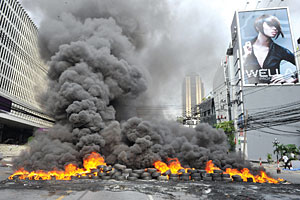 RSS |
The street protests by the red-shirts in Bangkok have been forcefully suppressed by the Thai Army. Demonstrators had occupied busy commercial thoroughfares in the city centre, but retreated in the face of army manuoevres to evict them, ostensibly to prevent further bloodshed. A potential civil war was averted. Nonetheless, 76 people lost their lives and over 2,000 were injured.
The red-shirt demonstrators were supporters of exiled ex-prime minister Thaksin Shinawatra, comprising both rural Thais and the working class of the capital. The current crisis was precipitated in 2006 when Thaksin was stripped of powers through a coup indirectly supported by the monarchy. In subsequent elections, proxies of Thaksin were elected but in 2008, anti-Thaksin, middle-class, urban yellow shirt protestors forced the government to resign. The red-shirts had hoped to achieve the same by forcing the resignation of Democrat Party Prime Minister Abhisit Vejjajiva's government. Street politics is nothing new in Thailand but it didn't have the desired result this time around.
The Thai and Nepali contexts may not be the same but there are some parallels to be drawn between the recent protests in both countries. Both sets of protestors took control of the streets. The urban protestors were from the working class in Bangkok and in Kathmandu. Both protests failed to achieve their objective, and the lesson is the same.
Both protests demanded that democracy be broadened to include the most marginalised sections of society. But the use of violence by the Bangkok protestors provoked the government to respond with force, compelling them to retreat.
If Nepal does not adopt a politics of consensus soon there is still the risk of a similar confrontation here. Our politicians should learn from the anarchy in Bangkok, avoid confrontational trajectories, and focus on extending the Constituent Assembly. As time runs out for this institution, there is fear, tension and confusion in the air. Let's
find a consensus while there's still time.


